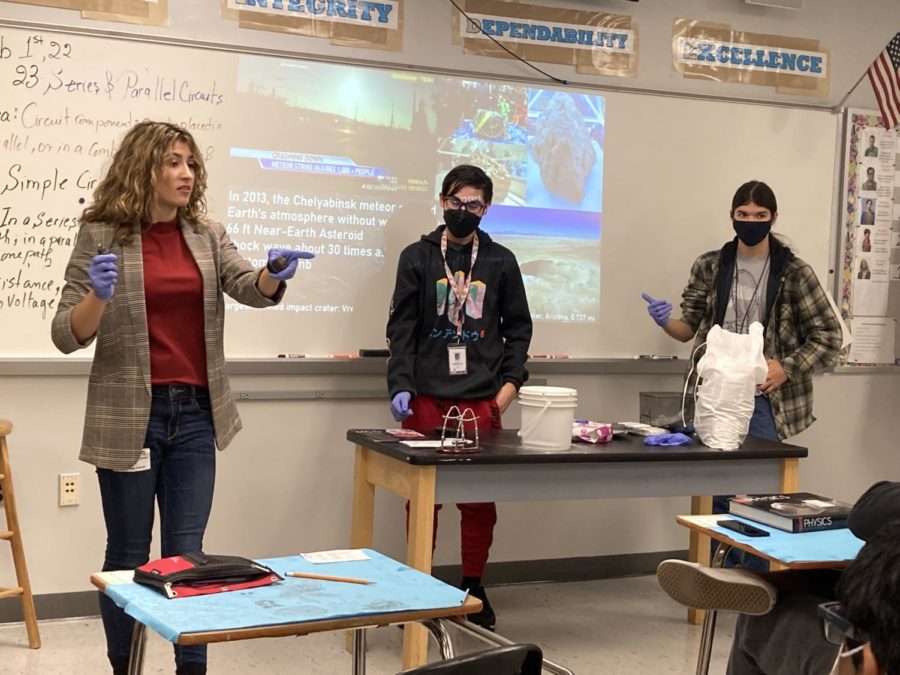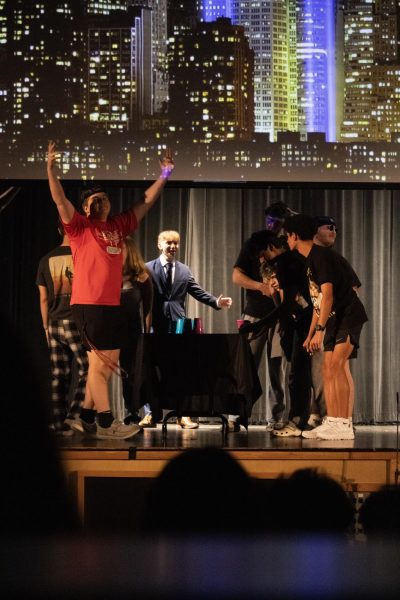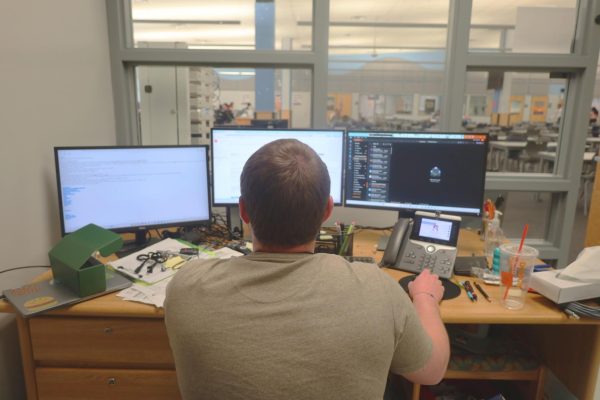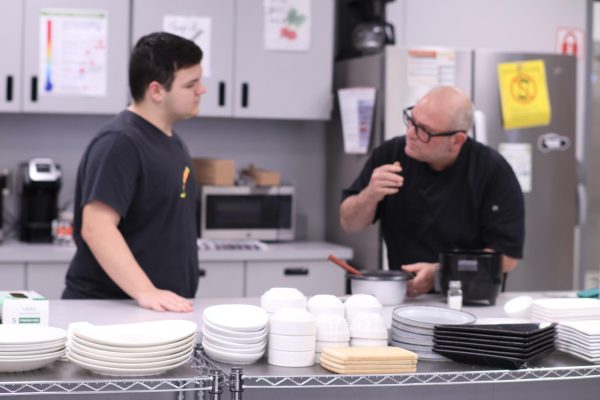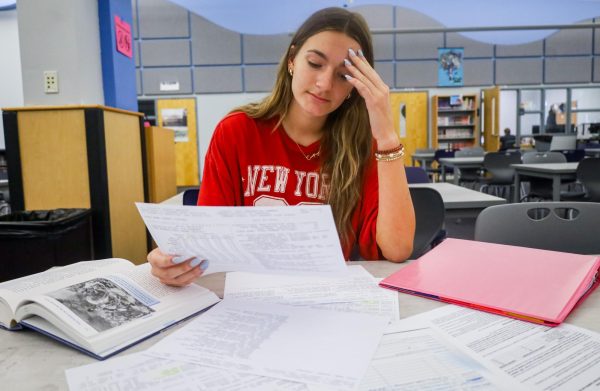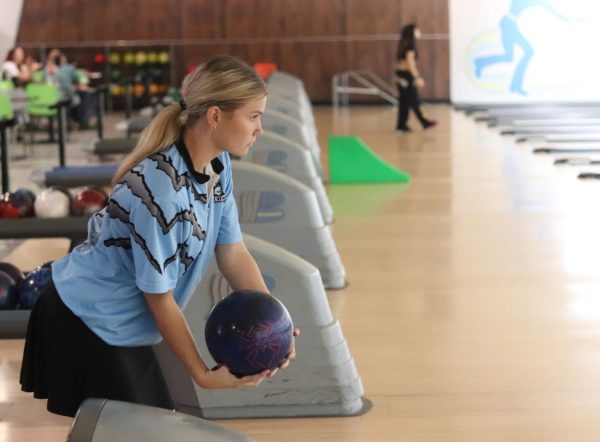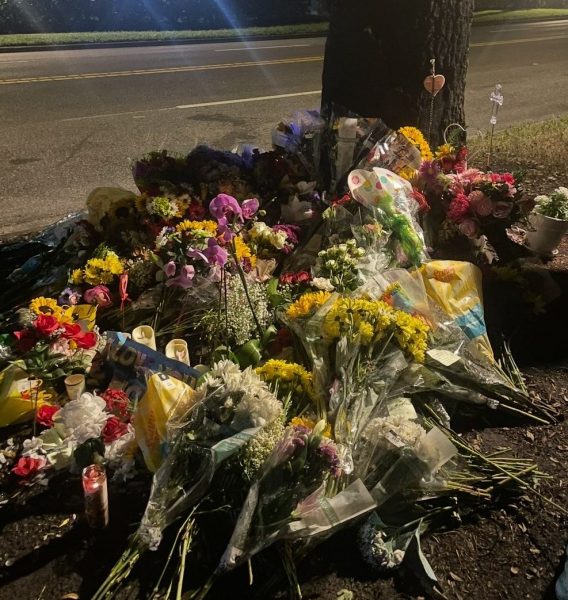How to make space dirt
Exolith Lab’s Ana-Paula Dovali provided synthesized “moon dirt” for Bekheit’s students to interact with and offered a volunteer opportunity to work at the lab
photo by Janell Lim
Dovali asks for two volunteers to help her with her presentation. The volunteers were given samples of meteorites and asked to identify which class they belonged to by their difference in density.
If you want to make space dirt, the first thing you need to do is study samples from space. Next, find materials on Earth most similar to those samples. After that, crush particles down to a powder-like substance. Finally, combine to create a crude product. Put all these ingredients together and viola, space dirt.
This recipe may seem out-of-this-world, but for the scientists at UCF’s Exolith Lab, it is a part of their daily lives.
On Wednesday, Feb. 2, lab researcher Ana-Paula Dovali came to visit physics teacher Amany Bekheit’s classes. As the Education Outreach Coordinator at Exolith Lab, Dovali gives educational presentations to students K-12 throughout central Florida. Bekheit’s students were given the opportunity to learn about space geology, the field of space research, and even touch “space dirt,” synthesized terrestrial material made to simulate the dirt on the moon, Mars, and asteroids.
Exolith Lab is a not-for-profit lab largely funded by The Center for Lunar & Asteroid Surface Science at UCF. They develop and produce lunar, martian, and asteroid regolith (soil) simulants, working with NASA while also performing its own research led by Dr. Daniel Britt and Dr. Zoe Landsman.
By manufacturing regolith, or “space dirt,” Exolith provides sustainable alternatives to test hardware such as rovers before leaving Earth, thereby decreasing the chance of failure once the rover actually lands in space.
“All the ‘dirt’ that we ship is to help further someone’s space research,” Dovali said. “The work we do is helping humanity take another step forward in space exploration.”
During the presentation, students learned everything from how the solar system first formed to properties of asteroids. For senior Miriam Restrepo, learning about space initiatives on growing plants on the Moon was most intriguing to her.
“It’s just kind of crazy to imagine going out into space and you just start growing plants on this rock in space,” she said.
In addition to teaching students about space geology and handing out free samples of lunar simulants, Dovali spoke about the volunteer program Exolith Lab offers. Open to students 15 and up, student volunteers will work on Exolith Lab’s production team and help make regolith simulant. Dovali warns that the program is very manual labor-intensive. Applicants should be able to carry a weight of 45 lbs and not be afraid to get dirty. Those interested can apply here with their resume, and any questions can be emailed to [email protected].
Although Restrepo does not plan to major in a space research field in college, Dovali still encourages students like her to apply.
“People are usually under the impression that to go to space or work at NASA, you have to be an aerospace engineer and know how to build a rocket. That’s not true!” Dovali said. “The space science field is huge and encompasses a variety of unique fields of study. Students can choose to make a career in graphic design or biomedical sciences or agriculture or even civil engineering while still having a space focus.”
Convinced, Restrepo applied for the program just one day after Dovali’s presentation.
“I hope to gain a lot of knowledge about what goes on with space exploration and just get on-the-job experience,” she said.
As for Dovali, her admittance to UCF spawned her interest in the space research field.
“When I was little, I used to read all these old science fiction novels that would talk about humans exploring the galaxy and being able to find new worlds,” Dovali said. “As I grew up, I figured it would be a wishful dream to even think about going to space. Once I started at UCF, I learned that having a career in space isn’t a dream: it can be my reality. UCF is one of the top space research institutions in the United States and allowed me to explore my career as an astrobiologist.”
Living out her childhood dream is not the only benefit Dovali found in working at Exolith Lab.
“I always nerd out when I realize I’m working with ‘moon dirt’ or ‘Martian dirt,’” Dovali said. “The research I’m doing is to help the human species expand to other planets. I’m proud to say that I conduct regolith research and help further space exploration.”
Dovali will be back at Hagerty on Feb. 25, presenting to the National Science Honor Society.
Your donation will support the student journalists of Hagerty High School. We are an ad-free publication, and your contribution helps us publish six issues of the BluePrint and cover our annual website hosting costs. Thank you so much!

